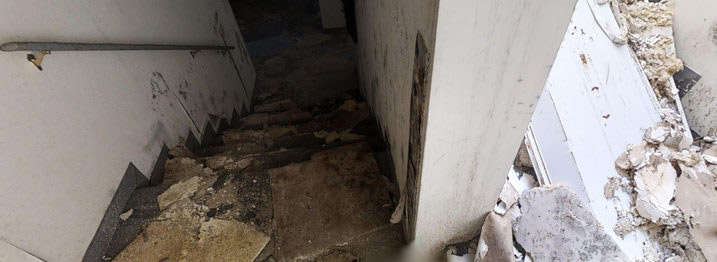
Water damage…the words alone are enough to make any homeowner shudder with fear. But if you own rental properties, you’re going to eventually face a situation where you have to deal with water damage. What do you do? Who is responsible? Where do your renters go? Questions like these abound – so make sure have the answers before something happens.
Research shows that water damage is the second most frequently filed insurance claim in the United States. Roughly 37 percent of homeowners make claims against losses from water damage and rental properties are not immune. The most common causes of water damage include:
The vast majority of water damage claims can be traced back to one of the aforementioned causes. Some of them can be prevented, while others are outside of your control. Either way, a hasty response is important if you want to limit the damage. Here are a few suggestions:
First and foremost, stop the flow of water into the home. This is the primary concern, as more water means more damage. If a tenant calls you on the phone and tells you about water damage, start by asking them to turn off the main water supply line to the house. (It’s for this reason that you should show every new tenant exactly where the main shutoff valve is located upon move-in.)
Once the water to the house is shut off, you and your tenant should immediately search for the source of the leak to make sure that the flow of water has indeed stopped.
You don’t have much time to wait around. The biggest problem with water damage isn’t the actual standing water itself. Once the water recedes and you’re left with a wet and humid environment, it’s conducive to mold growth. This growth can occur in less than 48 hours. Act quickly!
“As soon as the water level drops, landlords need to visit their properties to assess the damage and work with the tenants, if there are any, to remove wet property,” real estate investor Anum Yoon writes. “Drywall and insulation will need to be removed and replaced, and the frame of the house will need to be inspected for water damage. Block homes are less susceptible to water damage than wood frame houses, but they can still be damaged by rising waters.”
Unless you have experience dealing with water damage in a past life, it’s best to call in the professionals and put them to work on the job. They’ll ensure everything is removed properly so that no mold growth can occur.
In the immediate aftermath of water damage, both landlords and tenants immediately wonder who is at fault? In other words, how much is this going to cost me?
“The determining factor will be the legal decisions in the state, which help determine where exactly that line between liability and non-liability fall,” FreeAdvice.com explains. “Different states have differing attitudes…sometimes favoring landlords, sometimes favoring renters.”
The last thing you want to do is break the law and set yourself up for a lawsuit (on top of an expensive water damage issue). The best course of action is to get your tenant a temporary place to stay while everything is worked out.
Finally, contact your insurance agent to inform them of the situation and to fill out the proper paperwork for a claim. Your agent will be able to help you determine what’s covered. If there are any discrepancies, you may need to hire an attorney to help protect your rights.
While you can’t do much about water damage that’s already occurred, there are plenty of preventative steps that you can take to lower the likelihood of a similar situation happening again. Here are a few suggestions:
In addition to following these suggestions, make sure you have adequate insurance on each of your properties. This is especially important for units that are located in flood zones or other areas of concern. Find out the different options you have for coverage and spend as much as you can reasonably afford to protect your properties from going under water (literally and figuratively).
No landlord wants to wake up in the morning to a dozen missed calls and a panicky voicemail from a tenant whose property has been flooded. Not only does water damage leave you with a homeless tenant on your hands, but it can also prove to be an expensive issue that chokes out your cash flow. Therefore, it never hurts to have a little assistance.
When you hire a property management company, you instantly gain access to a team of professionals who are on your side and ready to help. Whether it’s water damage, late rent checks, or a minor inconvenience, a property manager will handle all of the details so that you can focus on the big picture.
For more information on the most respected property management service in the Houston area, please contact Green Residential. Whether you have one property or a portfolio of dozens, we’d be happy to partner with you!
